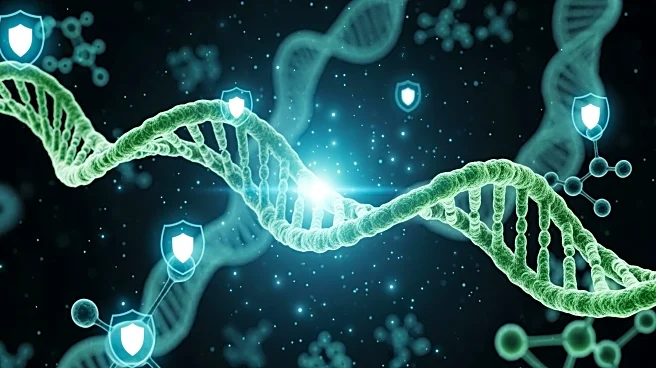What's Happening?
Researchers from Karolinska Institutet have uncovered how mammalian cells prevent the accumulation of harmful mutations in mitochondrial DNA (mtDNA). The study, published in Science Advances, reveals that mtDNA maintains its integrity through a genetic
bottleneck and purifying selection. These processes ensure that only a subset of mtDNA copies are transmitted from mother to offspring, allowing for the removal of defective mtDNA. The research utilized mouse models to demonstrate that fewer mtDNA copies result in greater genetic variation and fewer harmful mutations. Disruption of autophagy, a process that recycles damaged mitochondria, weakened this protective mechanism, leading to the accumulation of harmful mutations.
Why It's Important?
Understanding how cells preserve mitochondrial genome integrity has significant biomedical implications. Mutations in mtDNA are linked to various diseases, including mitochondrial disorders, cancer, neurodegeneration, diabetes, and aging. The findings provide a framework for studying how mtDNA quality control could be enhanced therapeutically, offering new perspectives for conditions driven by mitochondrial genome instability. This research could lead to advancements in treatments for diseases associated with mtDNA mutations, potentially improving health outcomes for affected individuals.
What's Next?
The study establishes a basis for further research into therapeutic strategies aimed at enhancing mtDNA quality control. Future investigations may focus on developing interventions that can strengthen the genetic bottleneck and purifying selection processes. Researchers may also explore the role of autophagy in maintaining mtDNA integrity and its potential as a target for therapeutic enhancement. These efforts could pave the way for novel treatments for diseases linked to mitochondrial dysfunction.
Beyond the Headlines
The discovery of the link between mitochondrial turnover, bottleneck size, and selection offers insights into evolutionary biology and the mechanisms that ensure species survival. The study highlights the importance of genetic processes in maintaining cellular health and preventing disease. It also underscores the potential for leveraging these natural mechanisms in developing medical interventions.















